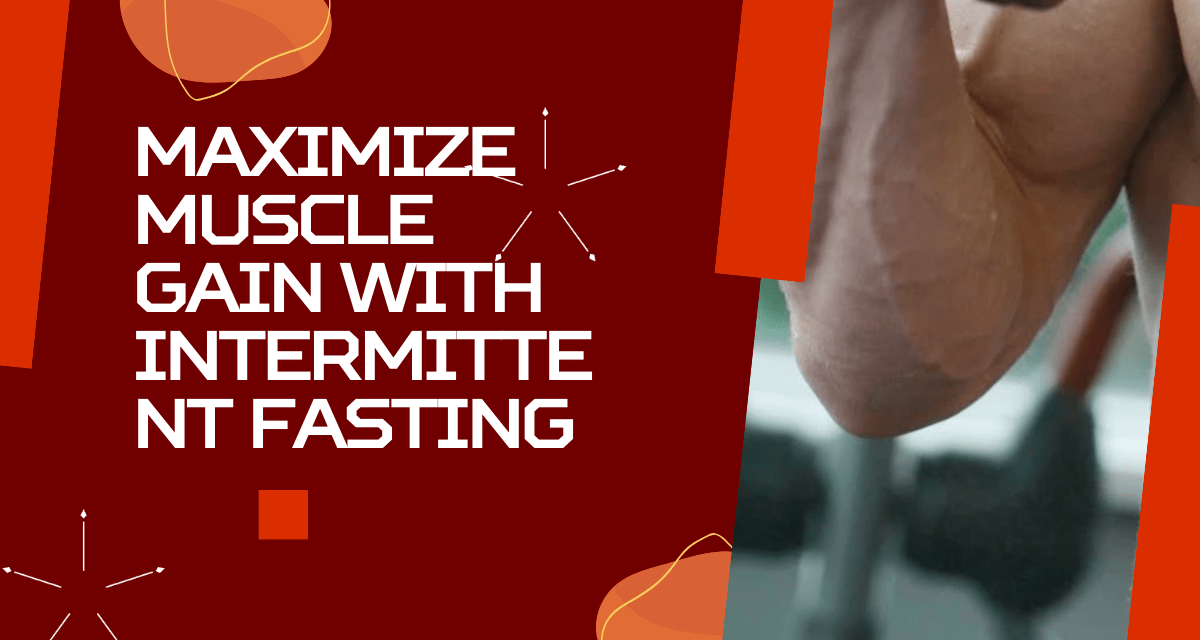Recent years have seen a notable increase in the popularity of intermittent fasting, both as a weight management tactic and for its possible benefits in muscle building. Although many individuals link fasting to weight loss, studies and anecdotal data indicate that intermittent fasting can actually be a useful strategy for increasing muscle mass. In this comprehensive guide, we will explore proven strategies to maximize muscle gain with intermittent fasting, ensuring you can achieve your fitness goals efficiently and sustainably.
Understand Intermittent Fasting first
Intermittent fasting involves alternating periods of eating and fasting. Unlike traditional diets that focus on what you eat, IF focuses on when you eat. The most common methods include:
- 16/8 Method: Fast for 16 hours and eat during an 8-hour window.
- 5:2 Method: Eat normally for 5 days and significantly reduce calorie intake for 2 non-consecutive days.
- Eat-Stop-Eat: Fast for 24 hours once or twice a week.
The primary benefits of intermittent fasting include improved metabolic health, enhanced fat loss, and increased human growth hormone (HGH) levels, which can aid muscle gain.
How Intermittent Fasting Affects Muscle Gain
To understand how intermittent fasting can help with muscle gain, it’s important to look at its impact on key physiological processes:
- Hormone Regulation: Intermittent fasting can increase the production of HGH, which plays a crucial role in muscle growth and repair. Higher levels of HGH can enhance muscle protein synthesis, leading to increased muscle mass.
- Improved Insulin Sensitivity: Fasting periods can improve insulin sensitivity, allowing for better nutrient partitioning. This means your body is more efficient at using nutrients like amino acids and glucose to build muscle rather than storing them as fat.
- Enhanced Fat Loss: By reducing body fat, intermittent fasting can help reveal muscle definition and improve the overall aesthetics of your physique. Lower body fat percentages are often associated with better muscle gain and retention.
Proven Strategies for Muscle Gain with Intermittent Fasting
Here are some effective strategies to maximize muscle gain with intermittent fasting:
1. Optimize Your Eating Window
Choosing the right eating window is crucial for muscle gain. The 16/8 method is popular among those looking to build muscle, as it allows for adequate nutrient intake within a relatively short period. Here’s how to optimize your eating window:
- Timing: Align your eating window with your workout schedule. If you train in the morning, break your fast post-workout to take advantage of the muscle-building benefits of nutrient timing.
- Frequency: Ensure you consume 3-4 balanced meals during your eating window to provide a steady supply of nutrients for muscle repair and growth.
2. Prioritize Protein Intake
Protein is the building block of muscle. To maximize muscle gain with intermittent fasting, it’s essential to prioritize protein intake:
- Daily Protein Target: Aim for at least 1.6-2.2 grams of protein per kilogram of body weight. This can be achieved through high-quality protein sources like lean meats, fish, eggs, dairy, and plant-based proteins.
- Distribution: Spread your protein intake evenly across meals to maintain a positive nitrogen balance and support muscle protein synthesis.
3. Incorporate Strength Training
Strength training is indispensable for muscle gain. When combined with intermittent fasting, it can produce impressive results:
- Consistency: Aim for at least 3-4 strength training sessions per week, focusing on compound movements like squats, deadlifts, bench presses, and rows.
- Progressive Overload: Continuously challenge your muscles by gradually increasing the weight or resistance used in your workouts.
4. Utilize Nutrient Timing
Nutrient timing can enhance the effectiveness of intermittent fasting for muscle gain:
- Pre-Workout Nutrition: If you train during your fasting window, consider a small pre-workout meal or supplement with branched-chain amino acids (BCAAs) to prevent muscle breakdown.
- Post-Workout Nutrition: Break your fast with a nutrient-dense meal rich in protein and carbohydrates to replenish glycogen stores and kickstart muscle recovery.

5. Stay Hydrated
Hydration plays a critical role in muscle function and recovery:
- Water Intake: Aim to drink at least 3-4 liters of water daily to support muscle function and overall health.
- Electrolytes: Ensure adequate intake of electrolytes, especially if you engage in intense workouts, to maintain muscle function and prevent cramps.
6. Get Adequate Rest and Recovery
Rest and recovery are essential components of muscle gain:
- Sleep: Aim for 7-9 hours of quality sleep each night to support muscle recovery and hormone regulation.
- Active Recovery: Incorporate low-intensity activities like walking or yoga on rest days to promote blood flow and reduce muscle soreness.
FAQs About Muscle Gain with Intermittent Fasting
1. Can I build muscle with intermittent fasting if I’m in a calorie deficit?
Yes, it is possible to build muscle in a calorie deficit, especially for beginners or those returning to training after a break. However, it is more challenging. Ensure you consume adequate protein and engage in regular strength training to maximize muscle gain.
2. Should I take supplements while practicing intermittent fasting?
Supplements can be beneficial, but they are not necessary. Prioritize whole foods for your nutrient needs. However, supplements like protein powder, BCAAs, creatine, and multivitamins can support your muscle gain goals.
3. Can women gain muscle with intermittent fasting?
Absolutely. Women can gain muscle with intermittent fasting just as effectively as men. The key is to ensure adequate protein intake, consistent strength training, and proper nutrient timing.
4. What should I eat during my eating window to maximize muscle gain?
Focus on nutrient-dense foods that provide a balance of macronutrients. Include lean proteins, complex carbohydrates, healthy fats, and plenty of fruits and vegetables. Examples include chicken breast, quinoa, avocado, sweet potatoes, and leafy greens.
5. How long does it take to see muscle gain results with intermittent fasting?
The timeline for seeing muscle gain results varies depending on factors like training intensity, diet, and individual genetics. Generally, noticeable changes can be seen within 8-12 weeks with consistent effort.
6. Is it okay to do cardio while practicing intermittent fasting?
Yes, cardio can be included in your routine. However, if your primary goal is muscle gain, prioritize strength training. Cardio should complement your training rather than detract from muscle recovery and growth.
7. Can intermittent fasting cause muscle loss?
When done correctly, intermittent fasting should not cause muscle loss. Ensure you consume adequate calories and protein during your eating window, and engage in regular strength training to preserve and build muscle mass.
8. What are some signs that intermittent fasting is working for muscle gain?
Signs include increased strength and performance in the gym, visible muscle definition, and an overall feeling of improved fitness and well-being. Regular progress tracking can help you monitor these changes.
9. How can I prevent muscle loss during the fasting period?
To prevent muscle loss, consume a protein-rich meal before your fasting period and consider supplementing with BCAAs if training in a fasted state. Ensuring adequate calorie and protein intake during your eating window is crucial.
10. Can I practice intermittent fasting forever, or should I cycle it?
Intermittent fasting can be a sustainable long-term lifestyle. However, cycling IF protocols or taking breaks can help prevent plateaus and maintain metabolic flexibility. Listen to your body and adjust as needed.
Conclusion
Intermittent fasting offers a unique and effective approach to muscle gain. By optimizing your eating window, prioritizing protein intake, incorporating strength training, and focusing on nutrient timing, you can maximize muscle gain with intermittent fasting. Remember to stay hydrated, get adequate rest, and monitor your progress to ensure you achieve your fitness goals. With dedication and consistency, you can unlock the full potential of muscle gain with intermittent fasting.



Its like you read my mind You appear to know a lot about this like you wrote the book in it or something I think that you could do with some pics to drive the message home a little bit but instead of that this is fantastic blog An excellent read I will certainly be back
I loved as much as you will receive carried out right here The sketch is attractive your authored material stylish nonetheless you command get got an impatience over that you wish be delivering the following unwell unquestionably come more formerly again since exactly the same nearly a lot often inside case you shield this hike